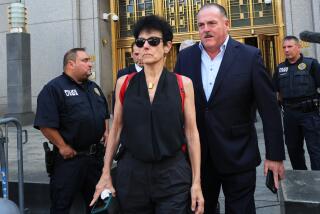Drexel, Milken Join Keating as Class-Action Defendants
- Share via
LOS ANGELES — Drexel Burnham Lambert and the former head of its junk bond department, Michael Milken, were added as defendants Friday in a class-action lawsuit against Lincoln Savings Chairman Charles H. Keating Jr. that claims investors lost $200 million investing in worthless securities sold at the thrift’s offices.
U.S. District Judge Stephen V. Wilson allowed an attorney for the investors to add Drexel and Milken, its now-indicted junk bond chief, to the suit, which alleges that Keating and Milken conspired to violate securities laws.
“They essentially aided and abetted in securities fraud with Keating,” said Joseph Cotchett, an attorney for the investors.
The suit claims that through their illegal dealings with one another, Drexel aided Lincoln Savings in defrauding 22,000 investors who purchased worthless securities at Lincoln offices. Lincoln was taken over by regulators last April. Analysts say that reimbursing depositors may cost taxpayers as much as $2 billion.
Neither Drexel Burnham nor Milken could be reached for comment.
The investor suit charges that Milken knew that Lincoln’s parent company--American Continental Corp., also headed by Keating--was no longer able to issue debt through the traditional means of an underwritten public offering and instead chose to sell its debt illegally through its Lincoln branches in Southern California.
Drexel Burnham, through the Beverly Hills office operated by Milken, underwrote American Continental debt and junk-bond purchases from Drexel Burnham. The suit said Milken aided the corporation and Lincoln in engaging in false commercial real estate and securities transactions, which served to prop up the thrift and its parent company.
American Continental was part of the “vast intertwined financial network”--a “Drexel Daisy Chain”--through which the investment banking company had unrestricted access to government-insured deposits, which were funneled into billions of dollars of Drexel junk bonds, the suit said.
Lincoln traded junk bonds with other daisy chain members at “artificial and escalating prices so that both parties could recognize artificial and improper profits,” the suit said. At one time, according to the court documents, Lincoln owned $650 million in Drexel-underwritten junk bonds, amounting to more than 14% of the thrift’s total assets.
The suit said other companies in the Drexel daisy chain were MDC Holdings Inc., Southmark Corp., CenTrust Savings, Imperial Savings, Columbia Savings and Loan and San Jacinto Savings.
More to Read
Inside the business of entertainment
The Wide Shot brings you news, analysis and insights on everything from streaming wars to production — and what it all means for the future.
You may occasionally receive promotional content from the Los Angeles Times.









